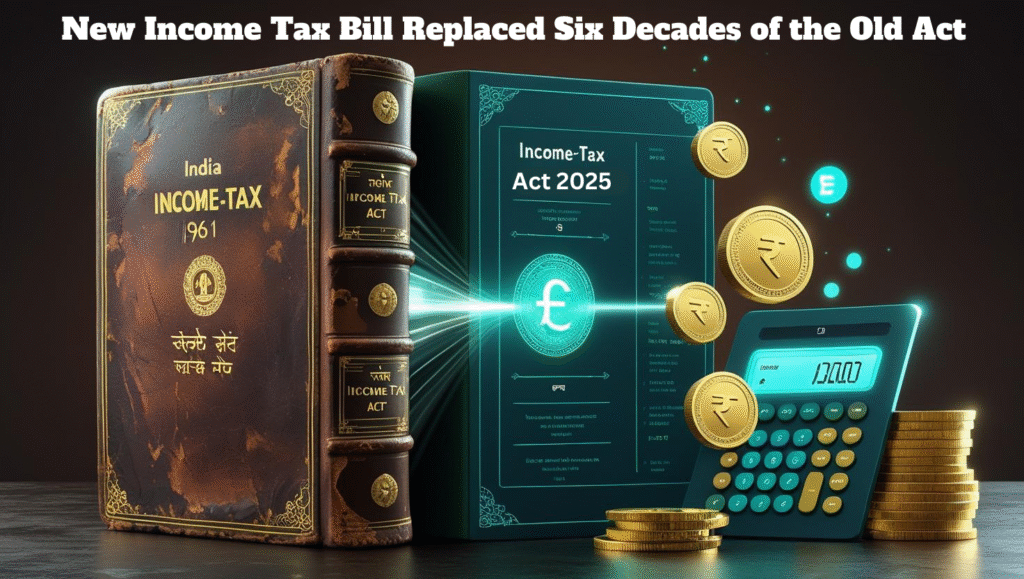
Table of Contents
ToggleNew Income Tax Bill Replaced Six Decades of the Old Act - A Historic Reform
August 13, 2025 | By Faiz Attari
In a landmark move that will transform India's taxation landscape, Parliament has passed the New Income Tax Bill Replaced Six Decades of the Old Act", marking the end of the 1961 Income Tax Act era. This revolutionary change comes after extensive consultations and represents the most significant overhaul of India's direct tax system since independence.
Why the "New Income Tax Bill Replaced Six Decades of the Old Act" Matters
Finance Minister Nirmala Sitharaman emphasized that the "New Income Tax Bill Replaced Six Decades of the Old Act" without introducing any new tax rates. The primary objectives were simplification, clarity, and modernization of language to make tax laws more accessible to common citizens.
Key Improvements
- Reduced from 819 to 536 sections
- Chapters cut from 47 to 23
- Word count reduced by 49% (5.12 lakh to 2.6 lakh)
- 39 new tables for clarity
- 40 simplified formulas
Implementation Timeline
- Passed by Parliament: August 12, 2025
- Effective from: April 1, 2026
- Drafting period: 6 months
- 75,000 person-hours invested
- IT system updates underway
The Journey of "New Income Tax Bill Replaced Six Decades of the Old Act"
The monumental achievement of seeing the "New Income Tax Bill Replaced Six Decades of the Old Act" come to fruition involved unprecedented efforts:
1. February 2025: Introduced during Budget Session
2. July 2025: Extensive committee reviews
3. August 10: Lok Sabha approval
4. August 12: Rajya Sabha passage
Finance Minister Sitharaman highlighted that Prime Minister Narendra Modi's vision ensured no additional tax burden on citizens during this transition, maintaining the government's commitment to taxpayer-friendly policies.
What Makes "New Income Tax Bill Replaced Six Decades of the Old Act" Different?
The "New Income Tax Bill Replaced Six Decades of the Old Act" represents more than just legislative updates - it's a complete reimagining of tax communication:
- Plain Language: Replaced archaic British-era jargon with contemporary Indian English
- Logical Structure: Reorganized provisions by taxpayer type rather than income source
- Digital-First: Designed for compatibility with online filing systems
- Global Standards: Aligns with international best practices while maintaining Indian context
Opposition Absence During "New Income Tax Bill Replaced Six Decades of the Old Act" Debate
In a surprising turn, the Opposition staged a walkout during discussions about the "New Income Tax Bill Replaced Six Decades of the Old Act", demanding parallel discussions on Bihar voter list revisions. Finance Minister Sitharaman expressed disappointment, noting pre-agreed debate time allocations in both Houses.
"We agreed for 16 hours of discussion in Lok Sabha and 16 hours in Rajya Sabha...where are they today?"
- Finance Minister Nirmala Sitharaman
Preparing for "New Income Tax Bill Replaced Six Decades of the Old Act" Implementation
With the "New Income Tax Bill Replaced Six Decades of the Old Act" becoming operational from April 2026, several preparatory measures are underway:

FAQs Coming Soon
Comprehensive guides to help taxpayers understand the new provisions

Simplified Rules
Department working on companion rules matching the Bill's simplicity

Tech Upgrades
Complete IT system overhaul to support the new law's implementation
Associated Reforms: Beyond "New Income Tax Bill Replaced Six Decades of the Old Act"
The Taxation Laws (Amendment) Bill, 2025 passed simultaneously introduces important changes:
- Modified block assessment procedures for search cases
- Tax benefits for Saudi Arabian public investment funds
- NPS benefits extended to new Unified Pension Scheme (UPS)
These complementary measures demonstrate the government's holistic approach to financial system modernization alongside the "New Income Tax Bill Replaced Six Decades of the Old Act".
Conclusion: Embracing "New Income Tax Bill Replaced Six Decades of the Old Act"
The passage of the "New Income Tax Bill Replaced Six Decades of the Old Act" marks a watershed moment in India's economic history. By replacing colonial-era complexity with contemporary clarity, this reform promises to:
- Enhance taxpayer compliance through better understanding
- Reduce litigation stemming from interpretation issues
- Improve India's ease of doing business rankings
- Modernize tax administration for the digital age
As the nation prepares for April 2026 implementation, all stakeholders - from individual taxpayers to corporate entities - should familiarize themselves with this transformative legislation that has successfully seen the "New Income Tax Bill Replaced Six Decades of the Old Act" become reality.

